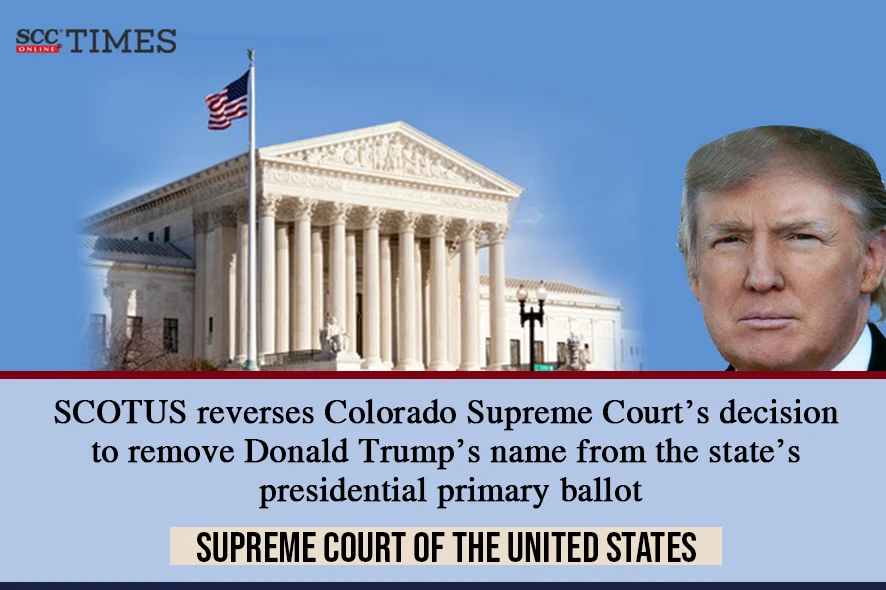Supreme Court of the United States (SCOTUS): In a major development before the upcoming Presidential Elections in the USA, the SCOTUS reversed the verdict of Colorado Supreme Court which had declared former President Donald Trump to be ineligible under U.S. Constitution’s Insurrection Clause and hence removed him from the State’s presidential primary ballot.
The Bench of John Roberts, CJ., Clarence Thomas, Samuel Alito, Sonia Sotomayor, Elena Kagan, Neil Gorsuch, Brett Kavanaugh, Amy Coney Barrett and Ketanji Brown Jackson, JJ., unanimously held that the power to enforce Section 3 of 14th Amendment to the US Constitution against federal officeholders and candidates, lies with the Congress and not the States.
Background: In September 2023, four Republican and two unaffiliated Colorado voters filed a petition against former President Trump and Colorado Secretary of State Jena Griswold in Colorado state court contending that after his defeat in 2020 Presidential Elections, Donald Trump disrupted the peaceful transfer of power by intentionally organizing and inciting the crowd that breached the Capitol as Congress met to certify the election results on 06-01-2021. Therefore, consequently Trump is constitutionally ineligible to serve as President again. The respondents contended that Section 3 of the 14th Amendment applies to the former President because after taking the Presidential oath in 2017, he intentionally incited the breaching of the Capitol on January 6 to retain power.
The Colorado Supreme Court with a ratio of 4:3 ordered the Colorado secretary of state to exclude the former President Trump from the Republican primary ballot in the State and to disregard any write-in votes that Colorado voters might cast for him.
The afore-stated decision was challenged by Donald Trump before the SCOTUS.
Core Issue: The SCOTUS had to decide that whether the Colorado Supreme Court err in ordering former President Trump’s exclusion from the 2024 presidential primary ballot?
Court’s Assessment: the Court noted that the 14th Amendment expand[ed] federal power at the expense of state autonomy” and thus fundamentally altered the balance of state and federal power struck by the Constitution.
Delving into the historical aspects of the provision in question, the Court pointed out that Section 3 of the 14th Amendment restricts state autonomy, but through different means. It was designed to help ensure an enduring Union by preventing former Confederates from returning to power in the aftermath of the Civil War. It was noted that Section 3 works by imposing on certain individuals a preventive and severe penalty like disqualification from holding a wide array of offices—rather than by granting rights to all.
The Court pointed out that Colorado Supreme Court itself also concluded that there must be some kind of “determination” that Section 3 applies to a particular person before the disqualification holds meaning. It was stated that the Constitution empowers Congress to prescribe how those determinations should be made. “The relevant provision is Section 5, which enables Congress, subject of course to judicial review, to pass ‘appropriate legislation’ to ‘enforce’ the Fourteenth Amendment”.
Considering the question that whether the States, in addition to Congress, may also enforce Section 3. The SCOTUS concluded that States may disqualify persons holding or attempting to hold state office, but States have no power under the Constitution to enforce Section 3 with respect to federal offices, especially the Presidency. Nothing in the Constitution delegates to the States any power to enforce Section 3 against federal officeholders and candidates.
The Court further pointed out that the text of the Fourteenth Amendment, on its face, does not affirmatively delegate power to enforce Section 3 to the States. The terms of the Amendment speak only to enforcement by Congress, which enjoys power to enforce the Amendment through legislation pursuant to Section 5. “The only other plausible constitutional sources of such a delegation are the Elections and Electors Clauses, which authorize States to conduct and regulate congressional and Presidential elections. But there is little reason to think that these Clauses implicitly authorize the States to enforce Section 3 against federal officeholders and candidates. Granting the States that authority would invert the Fourteenth Amendment’s rebalancing of federal and state power”.
The Court also pointed out that the respondents did not identify any tradition of state enforcement of Section 3 against federal officeholders or candidates in the years following ratification of the Four-teenth Amendment. “Such a lack of historical precedent is generally a “‘telling indication’” of a “‘severe constitutional problem with the asserted power”. The Court also highlighted that permitting state enforcement of Section 3 against federal officeholders and candidates would raise serious questions about the scope of that power. Section 5 limits congressional legislation enforcing Section 3, because Section 5 is strictly “remedial.
The Court pointed out that state enforcement of Section 3 with respect to the Presidency would raise heightened concerns. state-by-state resolution of the question whether Section 3 bars a particular candidate for President from serving would be quite unlikely to yield a uniform answer consistent with the basic principle that ‘the President represents all the voters in the Nation’. Conflicting state outcomes concerning the same candidate could result not just from differing views of the merits, but from variations in state law governing the proceedings that are necessary to make Section 3 disqualification determinations. “An evolving electoral map could dramatically change the behaviour of voters, parties, and States across the country, in different ways and at different times. The disruption would be all the more acute—and could nullify the votes of millions and change the election result—if Section3 enforcement were attempted after the Nation has voted. Nothing in the Constitution requires that we endure such chaos—arriving at any time or different times, up to and perhaps beyond the Inauguration”.
[Donald J. Trump v. Norma Anderson, No. 23-719, decided on 04-03-2024]
Image Source: Donald J. Trump / X.com






